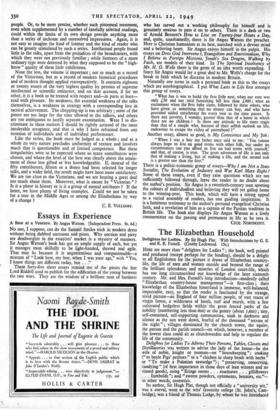Essays in Experience
A Bow at a Venture. By Angus Watson. (Independent Press. 8s. 6d.)
No one, I suppose, can do the Samuel Smiles trick in modern dress without being dubbed unctuous and pious. Why unction and piety are deadweights in the essayists' market is a mystery of manners. Sir Angus Watson's book has got an ample supply of each, but yet it manages most skilfully to be light-handed, shrewd and agile. That may be because it is unpretentious and companionable—a mixture of " Look here, my boy, when I was your age," with " Yes, I know things are different today, but . . ."
These forty-five short essays remind me of the pieces the late Lord Riddell used to publish for the edification of the young between the two wars. They are the wisdom of a brilliant man of business
who has carved out a working philosophy for himself and is genuinely anxious to pass it on to others. There is a dash or two of Arnold Bennett's How to Live on Twenty-four Hours a Day, and, quite, unashamedly, there is Sir Angus Watson the preacher. Here is Christian humanism at its best, matched with a devout mind and a believing heart. Sir Angus enjoys himself in the pulpit. His essays on Does God Intervene ?, Evangelism and Emotionalism, Why I Believe in Foreign Missions, 7onah's Sea Dragon, Walking by Faith, are models of their kind. In The Spiritual Insolvency of Mr. H. G. Wells there is the germ of an idea worth expanding. I fancy Sir Angus would lay a great deal to Mr. Wells's charge for the break in faith which he discerns in modern Britain.
Naturally one turns in such a personal book as this to the essays which are autobiographical. I put What Lasts in Life first amongst this group of essays.
" What fun it was to build the first little nest, when our rent was only £30 and our total furnishing bill less than £400 ; what an excitement when the first baby came, followed by three others, who have given us something that no money can buy, and who have provided added enrichment for every year as the time passes. Is there any poverty, I wonder, greater than that of a home in which there are no children ? Is there any attitude to life more tragic than that of a couple who, because of their selfish outlook on life, endeavour to escape the riches of parenthood ?"
Another essay, almost as good, is My Conscience and My 7ob: " When I was a boy my father once said to me: ' You cannot
always hope to live on good terms with other folk, but under no circumstances can you afford to live on bad terms with yourself,' and that, of course, is true. The great adventure of life is not only that of making a living, but of making a life, and the second task is a greater one than the first."
There is a politic-economic group of essays—Why I am Not a State Socialist, The Evolution of Industry and Was Karl Marx Right ? Some of these essays, even if they raise questions which are not sufficiently followed Lough, leave the reader in no doubt about the author's position. Sir Angus is a twentieth-century man sporting the colours of individualism and believing they will yet gallop home to the winning-post. This book, which will have a strong appeal to a varied assembly of readers, has one guiding inspiration. It is a luminous testimony to the author's personal evangelical Christian faith, and a revelation of him as a captain of the Puritan tradition in British life. The book also displays Sir Angus Watson as a lively commentator on the passing and permanent in life as he sees it.
CECIL NORTHCOTT.


































 Previous page
Previous page